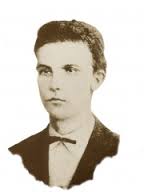![]() Is difficult not knowing to a “Pepe”. Yes, because that name is very frequent and multiplied in our language. But, what Pepe? Let’s make a little history.
Is difficult not knowing to a “Pepe”. Yes, because that name is very frequent and multiplied in our language. But, what Pepe? Let’s make a little history.
It more secure is that its origin was the of the abbreviation P.P. in them written old when is concerned to Jose, “father” of Jesus that also is put in them feet of them statues of this holy and when someone read the New Testament, to the refer is to it, said “Pater Putatibus” that then would be simplified orally to P.P. that gave origin to Pepe.
Another possible origin of Pepe is which includes the very well-known and prestigious dictionary of words of Alberto Buitrago and Agustín Torijano (piublicado in 1998) where States that the name of Joseph derived in Josef and then Josep and arriving in Castile the final p (per cacophony of speech) became pe. Thus arose after Pepe’s.
It could also be the origin of this word the word Italian Giuseppe (Joseph meaning) that going to the area Spanish-speaking turned into Giusepepe (Josepepe), and hence would be about Pepe as affectionate diminutive.
On the other hand, in it was Napoleon, during the short domination of Spain (1808-1816) is known that Napoleon Bonaparte named King of Spain to its brother greater Giuseppe with the name of Jose I of Spain (Giuseppe was corso and that then Corsica was of France). The case is that the Spaniards began to baptize the King as Pepe Botella, because the first law promulgated was the abolition of tax to alcohol (said that alcohol liked very much and was a real drunk). Why some say that Pepe de los José was born.
Is possible that Pepe derive of the last name d euna such Glugielmo Pepe, a general napolitano of the century 18th-19th (1784-1855) that directed the insurereecion Neapolitan in 1820, but was defeated by them troops Austrian in Rieti (of there came “fell as a Pepe” although I think that this phrase derives from the fall of Pepe bottle as King of Spain).
It is also possible, though I doubt it enough, that the voice of Pepe derives from the Pipinedas; a family of Austrasia descendant of Pepin of Landen (dead in the year 640) who founded the dynasty Carolingian in which highlighted several Pipinos, especially Pepin of Heristal (called Pepin the young) (635-714) that was father of the famous Carlo Martel and Pepin the short (715-768) son of the same Carlos Martel who to the die divided the Empire enter us two children Carloman and Charlemagne.
More insecure yet is that the word Pepe derives from two Pharaohs of the old Gazans who had the name of Pepe (some books cited them as Pepi). These I Pepe and Pepe II were from the period from the end of the sixth dynasty (of Saqqara) when you escriubio the Papyrus of Ani. But this Pepe is Egyptian name and the West is of Hebrew origin and means “the help” relating to the Lord.
There are those who say that Pepe was brought by Gypsies to Spain in the middle of the 15th century (the first written news of Gypsies in Spain is a document of King Alfonso V of Aragon called “King pass the Juan Conde de Menor Egpto”), although he was already known in Hungary and it seems that it is reflection of his stay in Egypt (which starts from the Pepe Pharaohs of Saqqara).
We could investigate more about the origin of this term but insist that it is safest to you have originated with P.P. by Jose (husband of Maria and father of Jesus) or the diminutive of Giuseppe (that also could have been the case). Neither rule out of their Roma origin. The other alternatives are difficult to accept.
The list of the Jose (Pepe) distinguished in the greater Antillean archipelago is so extensive that only going to mention a few:
José Martí, José Maceo, José de la Luz and Caballero, José Francisco Martí (the son of the national hero of Cuba), José María Heredia, José Jacinto Milanés, José Victoriano Betancourt, José Miró Argenter, Jose Morales Lemus, José Leocadio Bonachea, José (Pepe Antonio) Gomez, José Quintino (Quintin) flags, José Antonio Echeverría, Jose Luis Tassende, Jose (Pepito) Tey, José White, José de la Caridad Méndez José Luciano Franco, José María Chacón and Calvo, José Lezama Lima, Joseíto Fernández, José Soler Puig, José Antonio Portuondo, and many others.
Agencies / Various/Internet Photos/Arnoldo Varona/TheCubanHistory.com
THE CUBAN HISTORY, HOLLYWOOD.
![]() DE DONDE PROVIENE DE LOS JOSÉ EL APODO “PEPE”.
DE DONDE PROVIENE DE LOS JOSÉ EL APODO “PEPE”.
Es difícil no conocer a un “Pepe”. Sí, porque ese nombre es muy frecuente y multiplicado en nuestra lengua. Pero, ¿Por qué Pepe? Hagamos un poco de historia.
Lo más seguro es que su origen fuese el de la abreviatura P.P. en los escritos antiguos cuando se referían a José, “padre” de Jesús que además se ponía en los pies de las estatuas de este santo y cuando alguien leía el Nuevo Testamento, al referirse a él, decía “Pater Putatibus” que luego sería simplificado oralmente a P.P. que dío origen a Pepe.
Otro posible origen de Pepe es el que recoge el muy conocido y prestigioso Diccionario de Palabras de Alberto Buitrago y Agustín Torijano (piublicado en 1998) donde se señala que el nombre de Joseph derivó en Josef y luego en Josep y al llegar a Castilla la p final (por cacofonía del habla) pasó a pe. De ahí surgió después lo de Pepe.
También pudo ser el origen de esta palabra la voz italiana Giuseppe (que significa José) que al pasar a la zona hispano hablante se trocó en Giusepepe (Josepepe) y de ahí saldría lo de Pepe como diminutivo cariñoso.
Por otro lado, en la era napoléonica, durante la corta dominación de España (1808-1816) es conocido que Napoleón Bonaparte nombró rey de España a su hermano mayor Giuseppe con el nombre de José I de España (Giuseppe era corso y aquel entonces Córcega era de Francia). El caso es que los españoles comenzaron a bautizar al rey como Pepe Botella, porque la primer aley que promulgó fue la abolición de impuesto al alcohol (se decía que a él le gustaba mucho el alcohol y era un verdadero borracho). De ahí dicen algunos que nació el Pepe de los José.
Es posible que Pepe derive del apellido d euna tal Glugielmo Pepe, un general napolitano del siglo XVIII-XIX (1784-1855) que dirigió la insurereeción napolitana en 1820, pero fue derrotado por las tropas austríacas en Rieti (de ahí vino “cayó como un Pepe” aunque yo creo que esta frase deriva de la caida de Pepe Botella como rey de España).
También es posible, aunque lo dudo bastante, que la voz Pepe derive de los Pipínedas; una familia de Austrasia descendiente de Pipino de Landen (muerto en el año 640) quien fundó la dinastía carolingia en la que destacaron varios Pipinos, sobre todo Pipino de Heristal (llamado Pipino el Joven) (635-714) que fue padre del célebre Carlo Martel y Pipino el Breve (715-768) hijo del mismo Carlos Martel quien al morir dividió el imperio entres us dos hijos Carlomán y Carlomagno.
Más inseguro todavía es que el vocablo Pepe derive de dos faraones del antiguo Egipo que tenían el nombre de Pepe (algunos libros los citan como Pepi).Estos Pepe I y Pepe II fueron de la época de finales de la VI Dinastia (de Saqqara) de cuando se escriubió el papiro de Ani. Pero este Pepe es nombre egipcio y el José occidental es de origen hebreo y quiere decir “Ël ayudará” referiéndose a Jehová.
Hay quienes dicen que Pepe fue traído por los gitanos a España a mediados del siglo XV (la primera noticia escrita de gitanos en España es un documento del Rey Alfonso V de Aragón llamado “Salvoconducto de rey al Conde Juan de Egpto Menor), aunque ya lo conocían en Hungría y parece ser que es reflejo de su estadía en Egipto (por lo que arranca de los Pepe faraones de Saqqara).
Podriámos investigar algo más sobre el origen de este vocablo pero insisto en que lo más seguro es que se originó con el P.P. de José (esposo de María y padre de Jesús) o del diminutivo de Giuseppe (que también pudo haber sido este el caso). Tampoco descarto lo de su origen gitano. Las demás alternativas son difíciles de aceptar.
La lista de los José (Pepe) distinguidos en el mayor archipiélago antillano es tan extensa que solo voy a mencionar algunos:
José Martí, José Maceo, José de la Luz y Caballero, José Francisco Martí (el hijo del Héroe Nacional de Cuba), José María Heredia, José Jacinto Milanés, José Victoriano Betancourt, José Miró Argenter, José Morales Lemus, José Leocadio Bonachea, José (Pepe Antonio) Gómez, José Quintino (Quintín) Banderas, José Antonio Echeverría, José Luís Tassende, José (Pepito) Tey, José White, José de la Caridad Méndez, José Luciano Franco, José María Chacón y Calvo, José Lezama Lima, Joseíto Fernández, José Soler Puig, José Antonio Portuondo, y tantos otros.
Agencies/ Various/Internet Photos/Arnoldo Varona/TheCubanHistory.com
THE CUBAN HISTORY, HOLLYWOOD.








